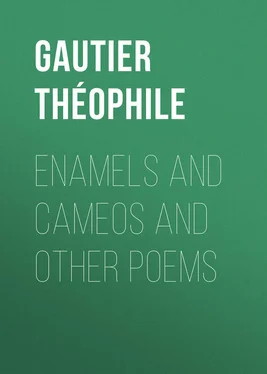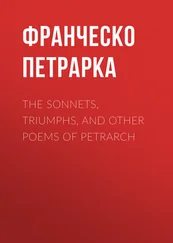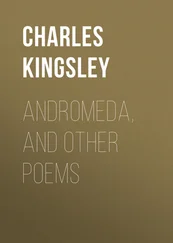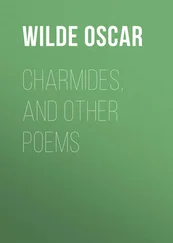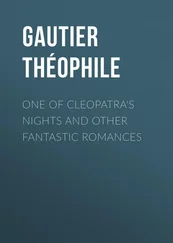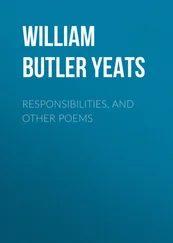Théophile Gautier - Enamels and Cameos and other Poems
Здесь есть возможность читать онлайн «Théophile Gautier - Enamels and Cameos and other Poems» — ознакомительный отрывок электронной книги совершенно бесплатно, а после прочтения отрывка купить полную версию. В некоторых случаях можно слушать аудио, скачать через торрент в формате fb2 и присутствует краткое содержание. Жанр: Поэзия, foreign_antique, foreign_prose, foreign_poetry, на английском языке. Описание произведения, (предисловие) а так же отзывы посетителей доступны на портале библиотеки ЛибКат.
- Название:Enamels and Cameos and other Poems
- Автор:
- Жанр:
- Год:неизвестен
- ISBN:нет данных
- Рейтинг книги:5 / 5. Голосов: 1
-
Избранное:Добавить в избранное
- Отзывы:
-
Ваша оценка:
- 100
- 1
- 2
- 3
- 4
- 5
Enamels and Cameos and other Poems: краткое содержание, описание и аннотация
Предлагаем к чтению аннотацию, описание, краткое содержание или предисловие (зависит от того, что написал сам автор книги «Enamels and Cameos and other Poems»). Если вы не нашли необходимую информацию о книге — напишите в комментариях, мы постараемся отыскать её.
Enamels and Cameos and other Poems — читать онлайн ознакомительный отрывок
Ниже представлен текст книги, разбитый по страницам. Система сохранения места последней прочитанной страницы, позволяет с удобством читать онлайн бесплатно книгу «Enamels and Cameos and other Poems», без необходимости каждый раз заново искать на чём Вы остановились. Поставьте закладку, и сможете в любой момент перейти на страницу, на которой закончили чтение.
Интервал:
Закладка:
Théophile Gautier
Enamels and Cameos and other Poems
THE GOD AND THE OPAL
Gray caught he from the cloud, and green from earth,
And from a human breast the fire he drew,
And life and death were blended in one dew.
A sunbeam golden with the morning's mirth,
A wan, salt phantom from the sea, a girth
Of silver from the moon, shot colour through
The soul invisible, until it grew
To fulness, and the Opal Song had birth.
And then the god became the artisan.
With rarest skill he made his gem to glow,
Carving and shaping it to beauty such
That down the cycles it shall gleam to man,
And evermore man's wonderment shall know
The perfect finish, the immortal touch.
Agnes Lee.
PREFACE
When empires lay riven apart,
Fared Goethe at battle time's thunder
To fragrant oases of art,
To weave his Divan into wonder.
Leaving Shakespeare, he pondered the note
Of Nisami, and heard in his leisure
The hoopoe's weird monody float,
And set it to soft Orient measure.
As Goethe at Weimar delayed
And dreamed in the fair garden closes,
And, questing in sun or in shade,
With Hafiz plucked redolent roses, —
I, closed from the tempest that shook
My window with fury impassioned,
Sat dreaming, and, safe in my nook,
Enamels and Cameos fashioned.
AFFINITY – A PANTHEISTIC MADRIGAL
On an ancient temple gleaming,
Two great blocks of marble high
Thrice a thousand years lay dreaming
Dreams against an Attic sky.
Set within one silver whiteness,
Two wave-tears for Venus shed,
Two fair pearls of orient brightness,
Through the waste of water sped.
In the Generalife's fresh closes,
By a Moorish light illumed,
Two delicious, tender roses
By a fountain met and bloomed.
In the balm of May's bright weather,
Where the domes of Venice rise,
Lighted on Love's nest together
Two pale doves from azure skies.
All things vanish into wonder,
Marble, pearl, dove, rose on tree,
Pearl shall melt and marble sunder,
Flower shall fade and bird shall flee!
Not a smallest part but lowly
Through the crucible must pass,
Where all shapes are molten slowly
In the universal mass.
Then as gradual Time discloses
Marbles melt to whitest skin,
Roses red to lips of roses,
And anew the lives begin.
And again the doves are plighted
In the hearts of lovers, while
Ocean pearls are reunited,
Set within a coral smile.
Thus affinity comes welling;
By its beauty everywhere
Soul a sister-soul foretelling,
All awakened and aware.
Quickened by a zephyr sunny,
Or a perfume, subtlewise,
As the bee unto the honey,
Atom unto atom flies.
And remembered are the hours
In the temple, down the blue,
And the talks amid the flowers,
Near the fount of crystal dew,
Kisses warm, and on the royal
Golden domes the wings that beat;
For the atoms all are loyal,
And again must love and greet.
Love forgotten wakes imperious,
For the past is never dead,
And the rose with joy delirious
Breathes again from lips of red.
Marble on the flesh of maiden
Feels its own white bloom, and faint
Knows the dove a murmur laden
With the echo of its plaint,
Till resistance giveth over,
And the barriers fall undone,
And the stranger is the lover,
And affinity hath won!
You before whose face I tremble,
Say – what past we know not of
Called our fates to reassemble, —
Pearl or marble, rose or dove?
THE POEM OF WOMAN MARBLE OF PAROS
Unto the dreamer once whose heart she had,
As she was showing forth her treasures rare,
Minded she was to read a poem fair,
The poem of her form with beauty glad.
First stately and superb she swept before
His gazing eyes, with high, Infanta mien,
Trailing behind her all the splendid sheen
Of nacarat floods of velvet that she wore.
Thus at the opera had he watched her bend
From out her box, her body one bright flame,
When all the air was ringing with her name,
And every song made her fair praise ascend.
Then had her art another way, for look!
The weighty velvet dropped, and in its place
A pale and cloudy fabric proved the grace
Of every line her glowing body took;
Till softly from her shoulder marble-sweet
The veil diaphanous fell, the folds whereof
Came fluttering downward like a snowy dove,
To nestle in the wonder of her feet.
She posed as for Apelles pridefully,
A lovely flesh and marble womanhood: —
Anadyomene, she upright stood
Naked upon the margent of the sea.
Fairer than any foam-drops crystalline,
Great pearls of Venice lay upon her breast,
Jewels of milky wonder lightly pressed
Upon the cool, fresh satin of her skin.
Exhaustless as the waves that kiss the brim,
Under the gleaming moon of many moods,
Were all the strophes of her attitudes.
What fascination sang her beauty's hymn!
But soon, grown weary of an art antique,
Of Phidias and of Venus, lo! again
Within another new and plastic strain
She grouped her charms unveiled and unique.
Upon a cashmere opulently spread,
Sultana of Seraglio then she lay,
Laughing unto her little mirror gay,
That laughed again with lips of coral red;
The indolent, soft Georgian, posturing
With her long, supple narghile at lip,
Showing the glorious fashion of her hip,
One foot upon the other languishing.
And, like to Ingres' Odalisque, supine,
Defying prurient modesty turned she,
Displaying in her beauty candidly
Wonder of curve and purity of line.
But hence, thou idle Odalisque! for life
Hath now its own fair picture to display —
The diamond in its rare effulgent ray, —
Beauty in Love hath reached its blossom rife.
She sways her body, bendeth back her head.
Her breathing comes more subtle and more fast.
Rocked in her dream's alluring arms, at last
Down hath she fallen upon her costly bed.
Her eyelids beat like fluttering pinions lit
Upon the darkened silver of her eyes.
Her bright, voluptuous glances upward rise
Into the vague and nacreous infinite.
Deck her with sweet, lush violets, instead
Of death-flowers with their every pearl a tear;
Scatter their purple clusters on her bier,
Who of her being's ecstasy lies dead.
And bear her very gently to her tomb —
Her bed of white. There let the poet stay,
Long hours upon his bended knees to pray,
When night shall close around the funeral room.
Интервал:
Закладка:
Похожие книги на «Enamels and Cameos and other Poems»
Представляем Вашему вниманию похожие книги на «Enamels and Cameos and other Poems» списком для выбора. Мы отобрали схожую по названию и смыслу литературу в надежде предоставить читателям больше вариантов отыскать новые, интересные, ещё непрочитанные произведения.
Обсуждение, отзывы о книге «Enamels and Cameos and other Poems» и просто собственные мнения читателей. Оставьте ваши комментарии, напишите, что Вы думаете о произведении, его смысле или главных героях. Укажите что конкретно понравилось, а что нет, и почему Вы так считаете.
